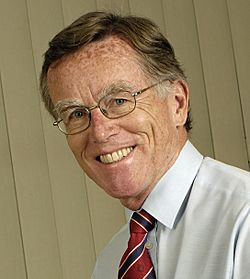Eduard Bomhoff facts for kids
Quick facts for kids
Eduard Bomhoff
|
|
|---|---|

Bomhoff in 2006
|
|
| Deputy Prime Minister of the Netherlands | |
| In office 22 July 2002 – 16 October 2002 Serving with Johan Remkes
|
|
| Prime Minister | Jan Peter Balkenende |
| Preceded by | Annemarie Jorritsma Els Borst |
| Succeeded by | Roelf de Boer |
| Minister of Health, Welfare and Sport | |
| In office 22 July 2002 – 16 October 2002 |
|
| Prime Minister | Jan Peter Balkenende |
| Preceded by | Els Borst |
| Succeeded by | Aart Jan de Geus |
| Personal details | |
| Born |
Eduard Jan Bomhoff
30 September 1944 Amsterdam, Netherlands |
| Political party | Independent (from 2003) |
| Other political affiliations |
Labour Party (1972–2002) Pim Fortuyn List (2002–2003) |
| Spouse |
Janneke Bomhoff
(m. 1966) |
| Children | 2 children |
| Residences | Kuala Lumpur, Malaysia |
| Alma mater | Leiden University (Bachelor of Economics, Master of Economics) Erasmus University Rotterdam (Doctor of Philosophy) |
| Occupation | Economist · Researcher · Academic administrator · Columnist · Author · Professor |
Eduard Jan Bomhoff (born September 30, 1944) is a Dutch economist and professor. He is also a retired politician. He served as the Deputy Prime Minister of the Netherlands for a short time. He was also the Minister of Health, Welfare and Sport. This was in the first government led by Jan Peter Balkenende in 2002. After his political career, he became an economics professor in Malaysia.
Contents
Early Life and Education
Eduard Jan Bomhoff was born in Amsterdam, Netherlands, on September 30, 1944. His family was part of the Old Catholic Church. His father was a minister and a professor. In 1957, his family moved to Leiden.
Bomhoff studied mathematics at Leiden University. He later earned a master's degree in economics there. In 1979, he received his PhD in economics from Erasmus University Rotterdam.
Academic Career
After his studies, Bomhoff taught about money and economics at Erasmus University. He became a professor in 1981. He also directed a special business program there from 1986 to 1989. Later, he taught finance at Nyenrode Business Universiteit.
In 1995, Bomhoff started an economic research group called NYFER. It offered different ideas from the official government economic office. He also wrote articles for a newspaper called NRC Handelsblad from 1989 to 2002.
Bomhoff joined the Labor Party in 1972. However, he later wrote articles that criticized the party. He felt there was a big difference between the party's leaders and its supporters.
Time in Politics
Serving as Deputy Prime Minister
Eduard Bomhoff became the Deputy Prime Minister of the Netherlands. He also served as the Minister of Health, Welfare and Sport. He held these roles from July 22, 2002, to October 16, 2002. He was part of the first government led by Prime Minister Jan Peter Balkenende.
Even though he had been a member of the Labour Party, he joined the Pim Fortuyn List (LPF) party. He accepted his government roles on behalf of the LPF. This was seen as a surprising move. Bomhoff later said he admired Pim Fortuyn's ideas. Fortuyn had criticized the traditional way Dutch politics worked.
While in government, Bomhoff pushed for more money to be spent on healthcare. He even suggested he might resign if the healthcare budget for 2003 was not much higher.
Leaving the Government
During his time in the government, there were disagreements within his party. Another minister from the LPF, Herman Heinsbroek, publicly criticized Bomhoff. Some members of the government, including Roelf de Boer, suggested that both Bomhoff and Heinsbroek should step down.
Bomhoff warned his colleagues that if they resigned, the other parties in the government might not let the LPF choose new ministers. Despite his warning, he and Heinsbroek were asked to resign. Just as Bomhoff had predicted, the other parties decided not to allow new LPF ministers. Instead, they chose to end the government and call for new elections. The LPF party never returned to the Dutch government after that.
Life After Politics
After leaving politics, Bomhoff went back to teaching. He became a professor at the University of Bahrain. Later, he taught at the University of Nottingham. He also led the social sciences department at the University of Nottingham Malaysia.
He then became an economics professor at Monash University Malaysia Campus in Malaysia. He retired from teaching in 2023. Bomhoff wrote a book about his time in government called Blinde Ambitie (Blind Ambition). This book is the only detailed account of the first Balkenende government.
He has also done research for the World Values Survey. This project studies people's values around the world. He has published his research in different journals. He also worked as an advisor to the Bank of Japan. Since 2020, he has written articles for a Dutch website and podcast called Wynia's Week.
Personal Life
Eduard Bomhoff is a member of the Old Catholic Church. He considers his religious beliefs to be a private matter. He has been married since 1976 and has two children.
 | Emma Amos |
 | Edward Mitchell Bannister |
 | Larry D. Alexander |
 | Ernie Barnes |

